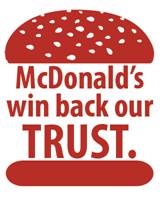 “The environment in which a message runs is part of the message.” Andrea Alstrup
“The environment in which a message runs is part of the message.” Andrea Alstrup
We’ve received some feedback and questions about our
efforts to hold McDonald’s accountable for their sponsorship behavior, so I’d like to take a moment here to explain what we’re doing and why.
McDonalds was once a family-friendly TV sponsor. That’s no longer the case. In fact, in recent years, McDonalds has been seen to support some of the very worst content on television. McDonald’s ad dollars have paid for:
- Jokes about child sex abuse on
Family Guy
- Graphic, gory violence on
Scandal and
The Following
- Explicit sexual content on
Reign
And more. In fact, the Parents Television Council recently looked at the
top sponsors of some of TV’s most problematic shows, and found that McDonald's was a frequent sponsor of the most sexually graphic and foul-mouthed shows on television.
Almost from the day the PTC was started, a cornerstone of our efforts has been holding companies accountable for the programs they make possible with their advertising dollars. Advertising revenue is the lifeblood of broadcast and basic cable television. It doesn’t matter how critically-acclaimed a show might be, or how many people love it or hate it, all that really matters at the end of the day, is how much money it makes for the network.
Many of us have been led to believe that networks program for us. That we are the end consumer and that television content is the product. A better way to understand the broadcast model, though, is to view ourselves as the commodity, the product being sold, and the advertiser as the end consumer. The networks aren’t selling programming to us, they’re selling eyeballs –us-- to advertisers.
If we wish to transform the media culture; if we wish to have a lasting impact on the kind of content streaming into our homes over the public airwaves, we have to transform the way advertisers view their responsibility to the public, and the way they think about television sponsorship.
When we first started contacting TV sponsors about what they were paying for with their ad dollars, the standard response was “Sponsors?! We’re not sponsors. We buy ad time on a show, but there haven’t been TV sponsors since the days of the Texaco Star Theater.” We set them straight. We explained that if they are buying time on certain programs in order to reach certain desired demographics, then spending their ad dollars on that program is a tacit endorsement of the content in that program. That strategy has been effective, and over the years, we’ve seen a number of companies pull their ad dollars from programs because of content concerns. We’ve also seen advertisers proactively working to create family programming that they can feel good about supporting with their advertising. The Family Friendly Programming Forum came about because of advertisers’ concerns about a lack of suitable programming they could support with their ad dollars.
But though we’ve had good success in persuading companies to withdraw their advertising support from specific programs; as soon as a new season gets underway, there’s a new crop of problematic shows, and we start all over again.
We need to persuade advertisers that they have the power to effect positive change; that they have a role to play in pressuring the networks to create suitable environments for their advertisements to run in. The key to cleaning up the airwaves is to convince advertisers, one company at a time, to change the way they approach TV sponsorship.
 “The environment in which a message runs is part of the message.” Andrea Alstrup
“The environment in which a message runs is part of the message.” Andrea Alstrup